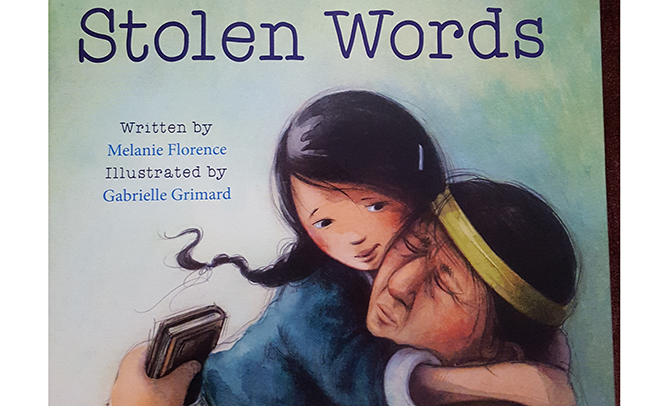Book Review: Grandfather explains how he lost his language at residential school
 By Carrie MacKenzie
By Carrie MacKenzie
“Stolen Words” by Melanie Florence and illustrated by Gabrielle Grimard is a beautiful, charming book for children ages six to nine. It tells the story of a little girl asking her Grandfather how to say “Grandfather” in Cree and learns that he cannot remember. He explains that he lost his language when forced to attend a residential school and speak English. It was released on September 5, 2017. This book has already won the Second Story Press Aboriginal Writing Contest and has been acknowledged as one of Minister of Indigenous and Northern Affairs Canada, Carolyn Bennet’s Indigenous Book Club Month picks.
The words Ms. Florence uses are simple but eloquent and poetic. This way the reader learns about the devastating multigenerational impact of residential schools on Indigenous language and culture through words they can understand. The reader connects with the pain the Grandfather feels about his experience at the residential school and the shame he suffers about not being able to teach his Granddaughter Cree. The Granddaughter’s sense of loss her language is also evident.
The tone of this book is gentle and calming like a grandparent’s touch. It tells of the Grandfather’s experience at a residential school in a way that is not overly graphic or emotionally overwhelming. In this way, the reader is not overcome by emotion and can understand what happened.
Adding to this soothing and tender, quality is the rhythm of the story. It is almost poetic, turning language into another character in the story, the words do not just tell the story they are part of it. This adds to the power the words have, increasing the impact of the story.
Inspirational is another way to describe this story. The ending will inspire Indigenous youth to learn the language of their people and help their elders rediscover their language. This story is moving in another way. It reduces the stigma around being a residential school survivor, showing everyone there is nothing to be ashamed of. The reader gets a sense of the healing that comes from talking about what happened.
There is also an element of sadness flowing through the story until the end where it becomes hopeful, almost joyful. The story gives hope that there is a chance that a language can be relearned and passed on to the next generation, strengthening a sense of identity and culture.
Gabrielle Grimard’s beautiful illustrations add another dimension to this moving story. They show the unique bond between a grandparent and their grandchild. She also uses some of her drawings to symbolize the feelings of imprisonment felt by the students at residential schools. The illustrations accompanying the Grandfather’s account of life at the residential school are void of the bright colours characterizing the other illustrations. This symbolizes what the children would have been feeling and shows what the loss of their language took from them. It took the brightness out of their world. It also brings great clarity to the emotions that the characters are feeling. You see the pain on the Grandfather’s face as he relates his experiences at the residential school. This pain mixed with compassion is mirrored by the Granddaughter as she comforts him. Later the reader sees the joy on their faces as they rediscover their language and regain their identity.
“Stolen Words” would be an asset to any home or school library. It is a very powerful tool to educate both Indigenous and non-indigenous readers about the long lasting effects of the residential school system.
“Stolen Words “ By Melanie Florence, illustrated by Gabrielle Grimard, Second Story Press, ISBN 978-1-77260-037-7.

